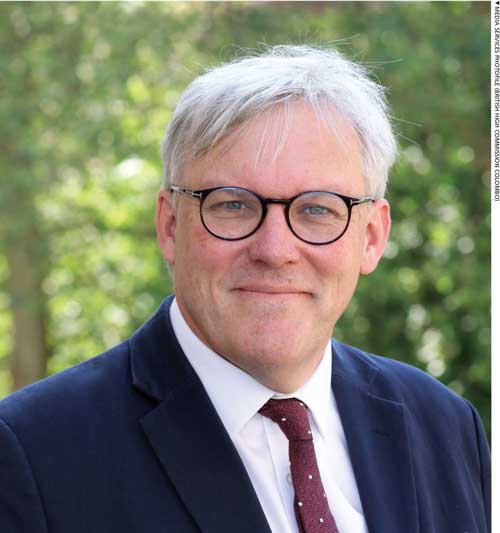TRANSCENDING BOUNDARIES
I am encouraged witnessing Sri Lanka’s hard work and economic reform translating into signs of recovery
British High Commissioner to Sri Lanka Andrew Patrick

Q: Sri Lanka and the UK marked 75 years of bilateral ties recently. How significant is this milestone in terms of future relations?
A: Sri Lanka and the UK have maintained vibrant and friendly relations for the past 75 years through our people-to-people links and shared values. I believe this to be the cornerstone of our bilateral relations.
Looking back on the past year, we were able to commemorate 75 years of relations through a number of events including the three-day visit of Her Royal Highness Anne, the Princess Royal this January.
The past years have shown us how much our countries can achieve together, and remind us of the significant contributions Sri Lankan and British citizens have made towards building on this special relationship.
Q: Having been appointed as the British High Commissioner to Sri Lanka amid an economic crisis, have you observed any significant progress since your tenure began?
A: I am encouraged witnessing Sri Lanka’s hard work and economic reform translating into signs of recovery. The UK welcomes Sri Lanka’s commitment to implementing IMF policy reform, which is beginning to bear fruit.
I note for example that economic growth returned in the third quarter of last year for the first time since the last quarter of 2021. However, it’s critical for Sri Lanka – especially during an election year – to build on its successful stabilisation and move towards broadbased, sustainable and inclusive growth.
Maintaining reform momentum is key to achieving a full and lasting economic recovery that benefits the people of Sri Lanka.
Q: How does your experience serving in Myanmar, Afghanistan and South Africa differ from your role here in Sri Lanka?
A: It is impossible to compare these countries – but serving in them does give me a useful perspective when Sri Lankans tell me that they’re pessimistic about the country’s future.
Part of the reason I’m an optimist is because despite the setbacks here, I can see Sri Lanka’s huge strengths compared to countries such as Myanmar and Afghanistan.
Q: What opportunities do you see for expanding economic collaboration between the UK and Sri Lanka?
A: We remain committed to a long-term trade relationship with Sri Lanka.
From the perspective of what the UK offers Sri Lanka, there are several sectors where the former has expertise to support the latter’s potential and ambitions. Education, manufacturing, tech development, financial services and renewable energy are some key areas.
Major UK companies such as HSBC, Standard Chartered, Unilever, De La Rue Currency and London Stock Exchange Group (LSEG) have long established operations in Sri Lanka. The market is also a strong sourcing destination for retail brands including Marks & Spencer, Tesco and Next.
I have been impressed hearing their success stories and having visited some state-of-the-art facilities during my tenure here. These companies play a role in contributing both directly and indirectly to the local economy through the large number of jobs they provide.
The United Kingdom also remains a crucial partner in developing Sri Lanka’s talented workforce with over 35 universities and several professional qualifications – including the Chartered Institute of Management Accountant (CIMA) and Chartered Institute of Marketing (CIM) – that offer courses in this country.
This places Sri Lanka as the third largest source market for the UK in terms of transnational education.

Q: And what measures are being taken to facilitate business and investment between the two countries?
A: Last year, the United Kingdom implemented the Developing Countries Trading Scheme (DCTS) of which Sri Lanka stands to benefit from tariff reductions and simpler terms of trade, leading to increased competitiveness of Sri Lankan products in the UK market.
With the United Kingdom being the island nation’s second largest export market, the DCTS offers greater opportunities for trade as well.
As a way of supporting different businesses to take up the DCTS, the UK Trade Partnerships (UKTP) programme delivered by the International Trade Centre (ITC) has allocated GBP 200,000 of official development assistance (ODA) funding to Sri Lanka.
This provides targeted support for 10 competitively selected SME producers and exporters within different agricultural value chains including vegan, cosmetic products, speciality products and certified organic products.
The ultimate objective is to better equip and prepare Sri Lankan SMEs to participate successfully in trade fairs not only in the UK but wider international markets too.
Q: How do economic opportunities and job prospects in the UK influence the decisions of Sri Lankans to migrate – and how has this impacted both countries?
A: Open societies where principles of association and access to information thrive is something that the UK strongly believes in. With regard to Sri Lanka, a huge part of this is to do with the cross-sharing of education and expertise that has seen the strengthening of our ties.
For example, this free flow of information has seen Sri Lankans benefit from world-class education opportunities while also offering direct financial contributions to the UK. All these are underscored by open societies and individuals being able to make choices about how they want to live their lives.
Q: Have you discovered a favourite Sri Lankan dish? If so, what is it?
A: Cashew nut curry and batu moju.
Q: What aspect of Sri Lankan culture or tradition fascinates you the most?
A: Everything about the way people live here and how the different communities connect fascinates me.
Q: If you could participate in any Sri Lankan festival or celebration, which one would it be?
A: I was fortunate to be invited to the Kandy Esala Perahera, which is perhaps the most famous Buddhist festival. I would like to see the island’s traditional Hindu and Muslim festivals as well.
Q: If you were to recommend a must-visit place in Sri Lanka to your friends, where would it be?
A: Three places have really struck me so far. Two are firmly on the tourist trail – Galle and Kandy; but 15 years ago, I was lucky enough to visit the islands east of Jaffna and that really stuck in my memory.
Q: If you were to create a piece of art inspired by Sri Lanka, what would it be?
A: I used to paint so I suppose it would be a painting; and I’d try to capture the incredible green of the jungle.
Q: How would you describe Sri Lanka in a word or two…?
A: A paradise.
FACT FILE
FAMILY
Wife – Sanda (a Burmese national and businesswoman)
Teenage daughter
SCHOOLING
A local school in Cornwall (England)
HIGHER EDUCATION
Degree in mathematics
Diploma in law
